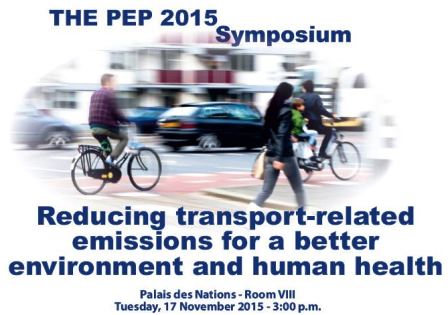
Policies to reduce air pollution and the promotion of sustainable transport have helped to significantly improve air quality in Europe. However, experts participating in the Transport, Health and Environment Pan-European Programme (THE PEP) Symposium in Geneva stressed that more needs to be done to meet WHO Air Quality Guidelines. Given the number of vehicles on our roads, Governments must put in place policies that focus on the quality of such vehicles, their fuels and their emissions.
Experts from the transport, health and environment sectors representing the international, national and local level gathered on 17 November 2015 at the Palais des Nations to discuss these issues, and in particular how to reduce transport-related emissions for a better environment and human health.
A key message of the symposium was that clean air policies work and that reducing air pollution does not impede economic progress. However, experts highlighted a number of remaining challenges as well as new findings linking air and noise pollution to an increased incidence of disease. In particular, studies have shown that:
· Air pollution remains a high burden for health. In 2014, WHO estimated that air pollution was responsible for 482,000 premature deaths per year in Europe.
· Noise pollution – including from transport – not only impacts quality of life but also has direct health effects, including cardio-vascular disease.
· Air pollution and noise have long-term and short-term effects and an increasing number of studies show linkages between exposure to air pollution and diabetes.
These findings need to be taken into consideration by policymakers when addressing noise and air pollution, especially with respect to setting air quality standards in the pan-European region. Experts also highlighted the need for a strengthened framework to monitor and regulate emissions, international, national and municipal level policies and actions to reduce air and noise pollution, and the importance of urban planning in reducing pollution.
For more information, please visit: http://www.unece.org/thepep/en/welcome.html